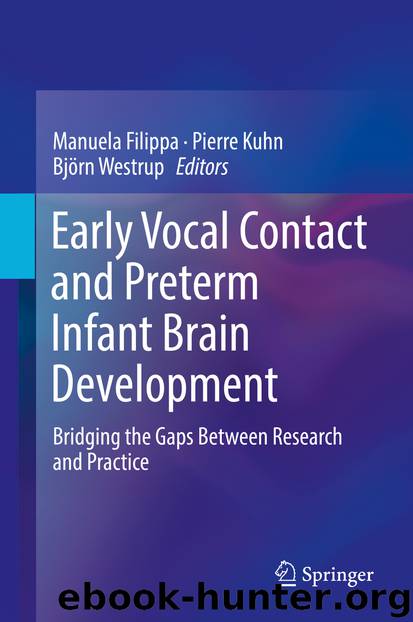Early Vocal Contact and Preterm Infant Brain Development by Manuela Filippa Pierre Kuhn & Björn Westrup

Author:Manuela Filippa, Pierre Kuhn & Björn Westrup
Language: eng
Format: epub
Publisher: Springer International Publishing, Cham
Hospitalization as a Cause of Distress and Speech Deprivation: Environmental Factors Leading to Language Delays
The environment of the NICU, which can include painful stimuli and high levels of light and noise, can cause distress in preterm infants. These factors may also adversely affect the development of a preterm infant via epigenetic mechanisms (see Montirosso & Provenzi, Chap. 16). Moreover, early experiences play a critical role in shaping the development of the brain and of behavior. There are several critical periods – windows of opportunity – during brain development in premature infants (Lagercrantz, 2016). During these periods, synaptogenesis alters neural connectivity patterns, according to an individual’s experiences and responses to the environment (Knudsen, 2004). The brain of a preterm infant does not develop as in the womb, and there are subtle differences in cerebral growth and development relative to a full-term infant (Ment, Hirtz, & Hüppi, 2009). This is due to prematurity itself and to exposure to a different environment (Perlman, 2001).
Among the many environmental factors that can influence language development in hospitalized preterm infants, we focus on two specific components: auditory dys-stimulation in the NICUs (amount, duration, and type) and early maternal/paternal separation.
Download
This site does not store any files on its server. We only index and link to content provided by other sites. Please contact the content providers to delete copyright contents if any and email us, we'll remove relevant links or contents immediately.
Rewire Your Anxious Brain by Catherine M. Pittman(18622)
Talking to Strangers by Malcolm Gladwell(13332)
The Art of Thinking Clearly by Rolf Dobelli(10390)
Mindhunter: Inside the FBI's Elite Serial Crime Unit by John E. Douglas & Mark Olshaker(9299)
Becoming Supernatural by Dr. Joe Dispenza(8186)
Change Your Questions, Change Your Life by Marilee Adams(7718)
Nudge - Improving Decisions about Health, Wealth, and Happiness by Thaler Sunstein(7679)
The Road Less Traveled by M. Scott Peck(7574)
The Lost Art of Listening by Michael P. Nichols(7480)
Mastermind: How to Think Like Sherlock Holmes by Maria Konnikova(7304)
Enlightenment Now: The Case for Reason, Science, Humanism, and Progress by Steven Pinker(7288)
Win Bigly by Scott Adams(7172)
The Way of Zen by Alan W. Watts(6578)
Daring Greatly by Brene Brown(6489)
Big Magic: Creative Living Beyond Fear by Elizabeth Gilbert(5726)
Grit by Angela Duckworth(5577)
Ego Is the Enemy by Ryan Holiday(5392)
Men In Love by Nancy Friday(5218)
The Laws of Human Nature by Robert Greene(5138)
